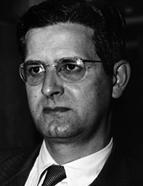

The economic and social analyses prevailed after the publication of Formação do Brasil contemporâneo , especially with História Econômica do Brasil [Economic History of Brazil] in 1945, the writing of the thesis Diretrizes para uma política econômica brasileira [Guidelines for an economic policy] for the aforementioned competition at the Law School in 1954, and the countless articles published in the Revista Brasiliense from 1955 onwards. In the 1950s, they divided their attention with epistemological studies that resulted in the publication of the books Dialética do conhecimento [Dialectics of Knowledge] in 1952, Esboço dos fundamentos da teoria econômica [Outline of the Foundations of Economic Theory] in 1957, and Notas introdutórias à lógica dialética [Introductory Notes to Dialectical Logic] in 1959. The studies he carried out persevered in outlining political action in search of a national project, planning, and state action to promote economic development based on Brazil's historical trajectory, as diagnosed in the research into the society born out of Portuguese colonisation. The publication of História econômica do Brasil complied with the request of the Mexican publisher Fondo de Cultura Económica and adapted the chapters and interpretations of the 1942 book to the purposes of the editorial theme. This was the second book of synthesis in Brazilian economic historiography, preceded by the two volumes by industrialist Roberto Simonsen, which were published in 1937 under the title História econômica do Brasil (1500-1822). In the volume of his thesis on Brazilian economic policy, Caio Prado Júnior reaffirmed the assumptions of his historical analysis as indicative of the opportunities that were opening up for the reorganisation of the national economy in the context of the second post-war period, the crumbling of the European colonial empires, and new challenges for the young African and Asian nations and the countries of Latin America, and the nationalist spirit that was pervading society and the direction of the Brazilian state. The confluence of these factors required, on the one hand, an understanding of the opportunities for change open to the nation's historical trajectory and future and, on the other hand, the definition of directions and measures to drive them forward and make them effective, based on the valuing of labour and the strengthening of domestic production and consumption. These were some of the "guidelines" used in the monograph written for the Law School competition. In Esboço dos fundamentos da teoria econômica [Outline of the foundations of economic theory], the author critically appraises the ways in which the economy is organised and the economic theories that conceive and explain them. This book closed the circle of analyses that involved the reality empirically observed in regional economic geography and in Brazilian history, the proposal of pragmatic solutions to the persistence of problems anchored in the colonial past and reinvigorated by the strength of imperialism, the theoretical basis that sought to consolidate the diagnosis formulated and the actions to induce social change in Brazil.
This work is financed by national funds through FCT - Foundation for Science and Technology, I.P, in the scope of the projects UIDB/04311/2020 and UIDP/04311/2020.
